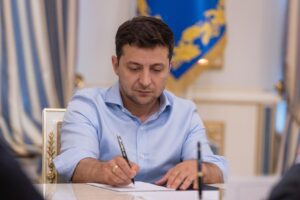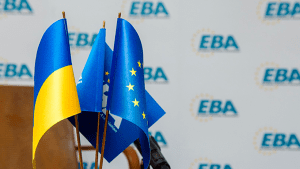
President of Ukraine Volodymyr Zelensky signed the law On Amendments to the Tax Code of Ukraine regarding the abolition of taxation of income received by non-residents in the form of payments for the production and/or distribution of advertising, and improvement of the taxation procedure for value added tax transactions for the supply of electronic services by non-residents to individuals No. 1525-IX, which the Verkhovna Rada adopted on June 3. The website of the head of state reports that the document defines a special taxation procedure for value added tax of non-resident companies that provide electronic services to persons residing in Ukraine.
“This will allow increasing state budget revenues from VAT. Such taxation rules are already becoming a common practice in foreign countries, for example, in the countries of the European Union, Australia, Belarus, Kazakhstan, and the like,” it said.
It is reported that foreign companies that supply electronic services to Ukrainians will be required to register as value-added tax payers using a simplified procedure through a special electronic service if the total amount from the implementation of the relevant transactions exceeds UAH 1 million per year. Non-residents will fill out simplified statements in electronic form in the state or English language.
At the same time, according to the document, transactions for the supply of distance learning services via the Internet are exempted from VAT if this network is used exclusively as a means of communication between a teacher and a student. Also, transactions on the supply of educational services by access to public educational, scientific and information resources on the Internet from the branches of knowledge and specialties in which the training of applicants for higher education is carried out are exempted from value added tax, if their implementation and provision does not require human participation.
From January 1, 2022, Ukrainian companies which pay for services for the production or distribution of advertising abroad, will be exempted from VAT.

President of Ukraine Volodymyr Zelensky at the Ukraine 30. Ecology forum signed a bill on limiting the circulation of plastic bags on the territory of Ukraine, which the Verkhovna Rada adopted on June 1, into law.
“Five hundred. This is how many packages every Ukrainian uses a year. Twenty minutes. This is how much we use this package on average. More than 100 years. This is how long one package decomposes and a few seconds – to sign a law,” the president said, according to the press service of the head of state.
The document regulates the circulation of plastic bags and should stimulate the development of the production of biodegradable bags.
In particular, the law prohibits the free distribution of plastic bags (except for biodegradable) in retail and catering. Plastic bags should be provided for money only. At the same time, retail prices for such packages cannot be lower than the minimum prices set by the Cabinet of Ministers of Ukraine.
In addition, mandatory labeling of biodegradable bags is envisaged and fines are set for violating these norms.
The document comes into force on the next day after its publication and will be effective six months from the date of entry into force, with the exception of some of its provisions.

Business awaits law enforcement reforms, but the latest version of the law on the Economic Security Bureau and the bill on the reform of the Security Service (SBU) adopted at first reading raise doubts about the quality of such reforms, the European Business Association (EBA) said in a release.
“It is worth noting that currently, the problem of cooperation with law enforcement agencies concerns not only SMEs and regional entrepreneurs but also large international companies and strategic investors,” the release says.
“The reform issue is especially relevant now in the context of the establishment of the Bureau of Economic Security. Although the community has not yet seen the final version of the document, the business was wary of the penultimate version of the draft law. Thus, there are fears that instead of a radically new analytical body that would help protect the interests of business, a new structure may be created with a new name, but with the same methods of work and even the same people,” the EBA says.
“At the same time, the SBU reform was launched, so to speak, by the adoption of the draft law No. 3196-d at first reading. Thus, the draft law was supposed to eliminate anti-corruption and economic units in the SBU, partially demilitarize the service, etc. However, there are fears that the liquidated SBU departments will be reincarnated as other functional units that will provide counterintelligence support in the economic context. In other words, it is likely to put continued pressure on the business. And, in general, this document invokes a lot of questions concerning the renewed functions and powers of the service,” it noted.
“Therefore, the European Business Association appeals to Volodymyr Zelensky, President of Ukraine, Denys Shmyhal, Prime Minister of Ukraine, and Arsen Avakov, Minister of Internal Affairs, to pay due attention to reforming the law enforcement system in 2021. It is unacceptable and unreasonable to persecute the business. Otherwise, the issue of attracting investment, business development, and economic development, in general, may become a big question. We hope that the time for fundamental reforms has come and we will finally move from talks to the action!” the document says.

President of Ukraine Volodymyr Zelensky commends the adoption of the law “On democracy through the nationwide referendum” (draft law No. 3612) by the Verkhovna Rada, the presidential press service reported.
“Now Ukrainians will be involved in practice in making important decisions for the country, and the government will be forced to listen to the will of the people. The referendum is an important tool for expanding democracy in Ukraine,” the President stressed.
Zelensky noted that the adoption of the relevant law was one of the important points of his election campaign during the presidential elections, as the document makes the dialogue between the government and society clearer.
It has been determined that the following issues cannot be the subject of the nationwide referendum:
– those contrary to the provisions of the Constitution of Ukraine, generally recognized principles and norms of international law, enshrined primarily in the Universal Declaration of Human Rights, the Convention for the Protection of Human Rights and Fundamental Freedoms, protocols thereto;
– those abolishing or restricting the constitutional rights and freedoms of man and citizen and guarantees of their realization;
– those aimed at eliminating the independence of Ukraine, violating the state sovereignty, territorial integrity of Ukraine, creating a threat to the national security of Ukraine, inciting interethnic, racial, religious hatred;
– those related to taxes, budget, amnesty;
– those referred by the Constitution and laws of Ukraine to the jurisdiction of the law enforcement agencies, the prosecutor’s office or the court.

Head of the Servant of the People faction David Arakhamia predicts that in February the Verkhovna Rada will be able to adopt draft law No. 3613 on democracy through a referendum at the second reading.
“We wanted to vote on the draft law on the referendum in December, but since there are 2,000 amendments, we need to work with their authors so that they either withdraw them or not insist on their consideration too much, that is, do not block the adoption of the law. Since it could be voted on in December according to the level of preparedness. I think we will accept it in February,” the politician told Interfax-Ukraine.
After this law, according to him, there will be more initiatives on electronic referendum, about local referendums, as well as the entire package of bills on democracy.
Arakhamia also believes that the Rada needs to develop an electronic voting model by the end of 2021, at least at the local level.

Minister of Culture and Information Policy Oleksandr Tkachenko expects that the Verkhovna Rada will soon adopt the law on the capital at the second reading.
“I took part in local elections. I voted at my polling station in Kyiv. I hope that local communities will receive worthy representatives in the government,” Tkachenko wrote on his Telegram channel on Sunday.
The minister also complained that the Verkhovna Rada did not have time to vote for the law on the capital at the second reading.
In his opinion, this law would radically change the opportunities, in particular, for the people of Kyiv to participate in the city’s self-government, as well as restore the district and local councils and allow the community to receive much more powers, including control over the activities of the authorities.
“However, I think that the parliament will be able to return to this issue in the near future,” Tkachenko added.